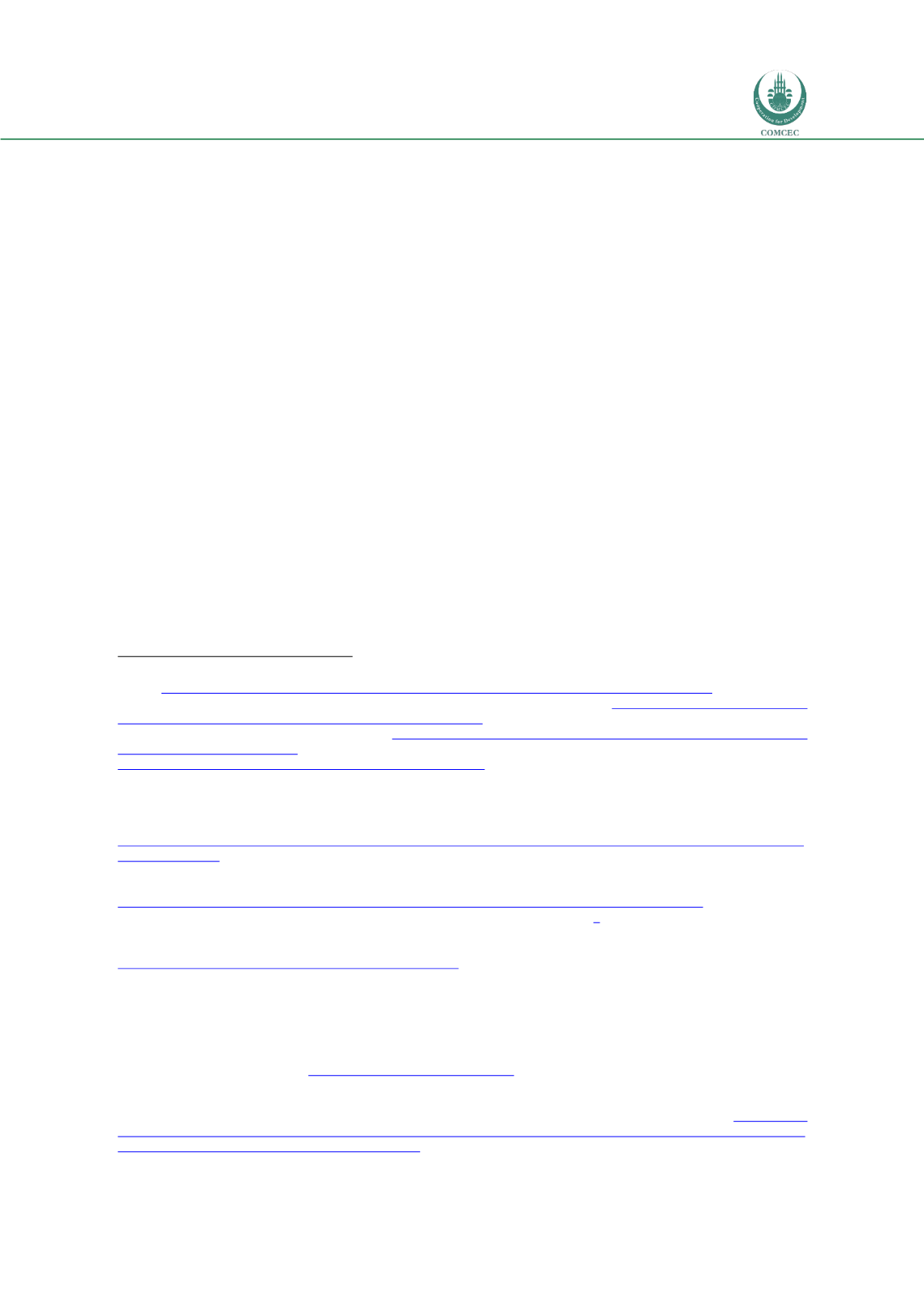

Forced Migration in the OIC Member Countries:
Policy Framework Adopted by Host Countries
123
actually belong to Moroccan immigrants residing abroad.
363
This discrimination renders
migrants and refugees particularly vulnerable to informal market scams, and migrants have
reported that lease agreements are particularly difficult to obtain in Morocco’s major cities,
such as Rabat.
364
But when migrants are able to find housing, rent prices tend to be
comparable to the amount paid by Moroccan citizens.
365
Employment
In addition to their residence cards, government-recognized refugees and regularized
migrants receive the right to work. Employers must typically give preference to Moroccan
nationals when hiring (i.e. an employer must prove there is no equally qualified native before
hiring a foreigner), though this requirement is waived for refugees and those regularized in
the exceptional program of 2014.
366
In reality, both irregular migrants and those with work
permits tend to work in Morocco’s underground economy, which is estimated to employ 30
percent of the Moroccan workforce overall.
367
In low-skilled positions, such as domestic work
and the agricultural sector, employers tend to abstain from providing contracts (for tax
reasons and general ease), rendering it obsolete whether or not a migrant holds the legal right
to work or not.
368
As a result, migrants are often left without social insurance or timely
remuneration.
369
At the moment, refugees and other migrants do not have access to the National Initiative for
Human Development (INDH), a nationwide poverty alleviation program,
370
but other
programs have been made available to authorized migrants. After the exceptional
regularization campaign, the national job placement agency (ANAPEC) has also extended its
363
Radio France Internationale (RFI), “Vive tension à Tanger entre marocains et migrants subsahariens,”
RFI
, September 1,
2014,
http://www.rfi.fr/afrique/20140901-vive-tension-tanger-entre-marocains-migrants-subsahariens ;Rik Goverde,
“Evicted migrants turn to the hills in Morocco,”
Middle East Eye
, July 7, 2015,
http://www.middleeasteye.net/in- depth/features/evicted-migrants-turn-hills-morcco-1210285763 ;Julie Chaudier, “Migrants subsahariens au Maroc : Que se
passe-t-il à Boukhalef ?”,
Yabiladi
, July 13, 2014
, http://www.yabiladi.com/articles/details/27649/migrants-subsahariens- maroc-passe-t-il-boukhalef.html ;BBC, “Migrants au Maroc : Arrestations musclées,”
BBC Afrique
, July 6, 2015,
http://www.bbc.com/afrique/region/2015/07/150706_morocco .364
GADEM,
Situation des Migrants dans le Sud du Maroc
365
GADEM,
Situation des Migrants dans le Sud du Maroc
, 23
366
Interview with UNHCR, March 2016; UNHCR, “Morocco Update: Regularisation of Refugees by National Authorities,”
updated December 2015,
http://ma.one.un.org/content/dam/unct/morocco/docs/UNHCR/UNHCR%20Morocco_Regularisation%20of%20Refugees _Dec%202015.pdf .367
Ibrahim Saif, “The Bloated Informal Economics in Arab Countries,”
Carnegie Endowment for International Peace
,
February 12, 2013
http://carnegieendowment.org/2013/02/12/bloated-informal-economies-in-arab-countries-pub-50966 .368
GADEM,
Situation des Migrants dans le Sud du Maroc: Mission d’observation cojointe
;
Interview with UNHCR, March 2016
369
Association Lumière sur l’émigration Clandestine au Maroc (ALECMA),
Migration subsaharienne au Maroc : Mission
d’observation dans les régions du Nord et Sud suite à la mise en place de la nouvelle politique migratoire
, (ALECMA, 2015), 12,
http://www.gadem-asso.org/IMG/pdf/rapport_alecma_2.pdf .370
The INDH was launched by the Moroccan government in May 2005 to reduce poverty and inequality. The massive, high-
profile program was initially estimated to cost MAD 10 billion (USD $1.2 billion) over five years, financed primarily by the
central government with international aid. The four main components of the program were: reduction of rural poverty,
reduction of social exclusion in urban areas, tackling “vulnerability,” and strengthening governance and institutional
capacity. These goals were promoted through various programs, including efforts to promote local development and
improve access to social services. More information can be found here: INDH, “Initiative Nationale pour le Développment
Humain,” accessed June 16, 2016
, http://www.indh.ma/index.php/en/ .The World Bank Group,
Implementation Completion
and Results Report (IBRD-74150) on a Loan in the Amount of EURO 78.9 Million (US$100.0 Million Equivalent) to the Kingdom
of Morocco for the National Initiative for Human Development Support Project (‘INDH;)
, (Report No. ICR1955, The World
Bank
Group,
Maghreb
Department,
January
31,
2013),
http://www- wds.worldbank.org/external/default/WDSContentServer/WDSP/IB/2012/06/25/000386194_20120625020004/Rendere d/PDF/ICR19550P100020C0disclosed060210120.pdf















